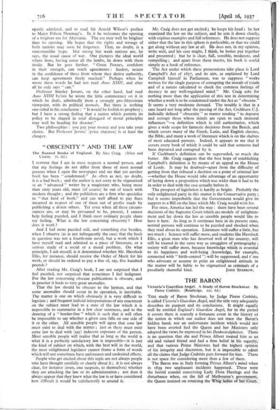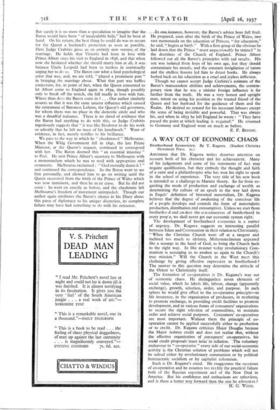THE BARON
Victoria's Guardian Angel. A Study of Baron Stockmar. By Pierre Crabites. (Routledge. 12s. 6d.)
Tins study of Baron Stockmar, by Judge Pierre Crabites, is called Victoria's Guardian Angel, and the title very adequately describes its purport and its conclusions. It might equally well be entitled England's Guardian Angel, for in the period it covers there is scarcely a fortunate event in the history of the nation in which our author does not trace the Baron's hidden hand, nor an unfortunate incident which would nbt have been averted had the Queen and her Ministers only adopted the views he expressed in his Denkwiirdigkeiten. There is no question that she and Prince Albert treated him as an old :and valued friend and had a firm belief in 1is sagaeity,i and that various Prime Ministers had the highest opinion of his integrity and discretion, but it - is impossible to admit all the claims that Judge Crabites puts forward for him. There is not space for considering more than a few of them.
The Baron was in Italy forming Prince Albert's mind when in 1839 two unpleasant incidents happened... These were the horrid scandal concerning Lady Flora Hastings and the disturbance when, on the fall of Melbourne's government, the Queen insisted on retaining the Whig ladies of her-Couit. But surely it is no more than a speculation to imagine that the Baron would have been " of incalculable help," had he been at hand. On his return, the best thing he could do was to secure for the Queen a husband's protection as soon as possible. , Here Judge Crabites gives us an entirely new version. of the ' marriage. He holds that Victoria had been in love with Prince Albert since his visit to England in 1836, and that when now she hesitated whether she should marry-him at all, it-vas. because Uncle Leopold had been so tactless in continually urging her to do so. The Baron saw what a fatal psychological error that was, and, we are told, " played a prominent part " in bringing the marriage about. What that part was baffles conjecture, for, in point of fact, when the Queen consented to let Albert come to England again in 1839, though possibly only to break off the match, she fell madly in love with him. Where then dogs the Baron come in ? . . . Our author similarly assures us that it was the same unseen influence which caused the retirement of Baroness Lehzen, the Queen's old governess, for whom there was no place in the domestic circle and who was a dreadful nuisance. There is no shred of evidence that the Baron had anything to do with this, so Judge Crabites ingeniously suggests that " it was like Stockmar to do his work so adroitly that he left no trace of his handiwork." Want of evidence, in fact, merely testifies to his brilliance.
We pass to the way in which he " checkmated " Melbourne. When the Whig Government fell in 1841, the late Prime Minister, at the Queen's request, continued to correspond with her. The Baron deemed this " an essential injustice " to Peel. He sent Prince Albert's secretary to Melbourne with a memorandum which he was to read with appropriate oral comments. Melbourne exclaimed : " God eternally damn it ! " and continued the correspondence. So the Baron went to see him personally, and allowed him to go on writing until the Queen recovered from the birth of the Prince of Wales which was now imminent, and then he mist cease. But he did not cease : he went on exactly as before, and the checkmate left 'Melbourne's freedom of movement unimpeded. Though our author again attributes the Baron's silence in his Diary about this piece of diplomacy to his unique discretion, its complete failure may have had something to do with his reticence. ,In zne.instance, however, the -flaron"s -advice bore full fruit. He prepared, soon after the birth of the Prince of Wales, two vast memoranda on the education of Princes, " for education," he said, " begins at birth." With a firm grasp of the obvious he laid down that the Prince " must unquestionably be trained " in the doctrines of the Church of England. Prince Albert followed out all the Baron's principles with sad results. His son was isolated -from boys of his own age, lest they should contaminate his morals, and the constant invigilation of tutors and the endless lessons led him to detest books. He always looked back on his education as a cruel and joyless infliction.
Though we cannot accept Judge Crabites's estimate of the Baron's transcendent abilities and achievements, the contem- porary view that he was a sinister foreign influence is far further from the truth. He was a very honest and upright man, intent on using his position as the trusted friend of the Queen and her husband for the guidance of them and the Realm. He desired no reward for his incessant labours except the sense of being invisible and powerful. That was always his, and when in 1855 he left England he wrote : " They have passed the point at which leading is required." He returned to Germany and England went on much as before.
E. F. BENSON.























































 Previous page
Previous page